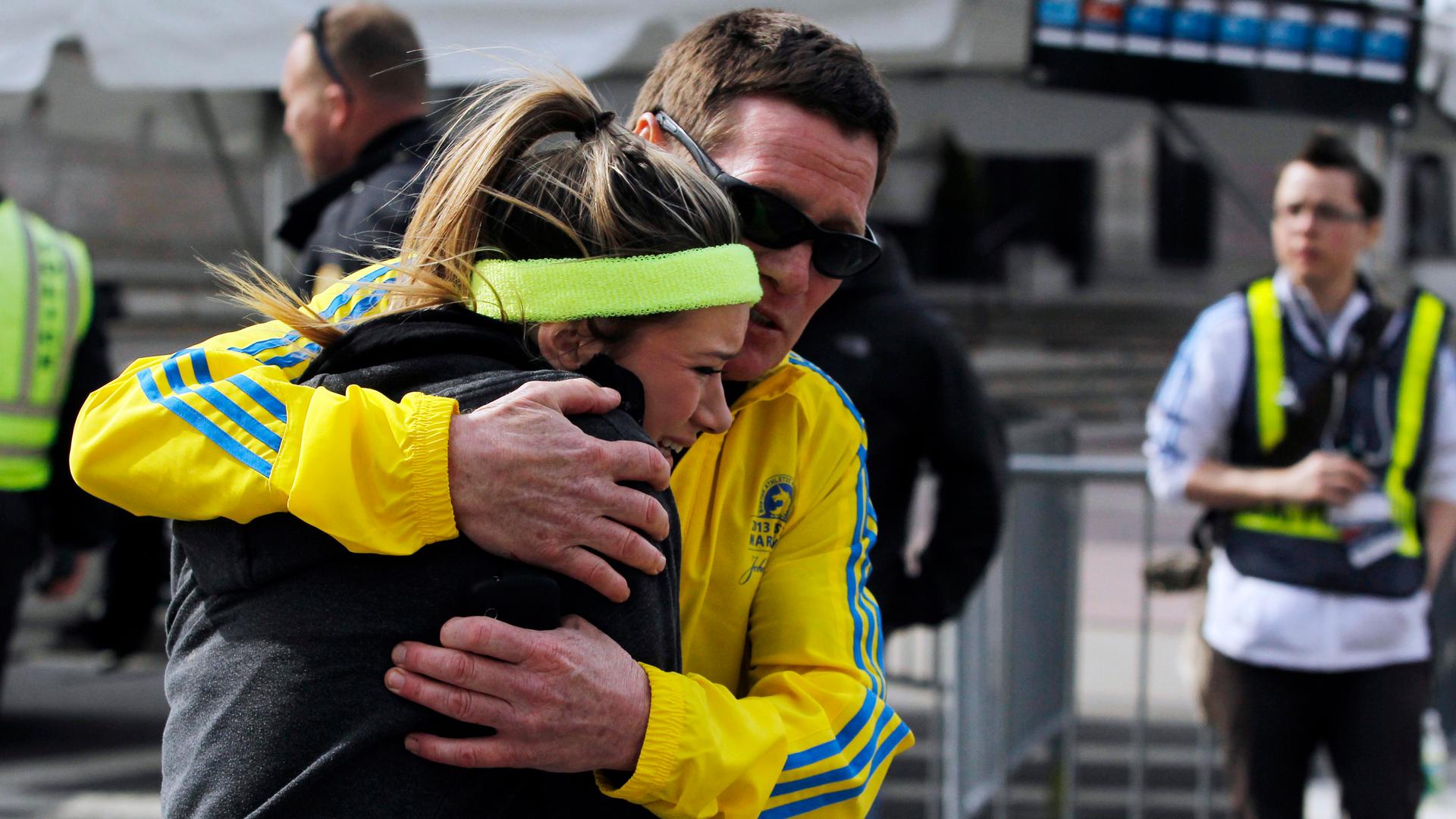Here’s a quick guide to handling the emotions that may come up with the Boston Marathon anniversary
A woman is comforted by a man near a triage tent set up for the Boston Marathon after the April 2013 bombings.
We’re just three weeks away from the anniversary of the Boston marathon bombings. And that could mean tough memories — and emotions — for anyone connected to the events.
That doesn't just include survivors, first responders and their families. It could also include runners from all over the world and much of the population of metropolitan Boston.
“The first year is likely to be very evocative,” says social worker Alice Cohen of Cambridge, Massachusetts. Cohen facilitated counseling sessions with a variety of groups in the aftermath of last April's tragic events.
“The interesting thing about traumatic memory is that it is sense-oriented," she says. "You remember sounds and pictures. It’s not organized in a linear narrative; it’s parked in the mind in different places. So it’s easy to be triggered.”
Cohen says she knows people who were near the bombs when they went off. Some still have a very high “startle response” when they hear a loud noise. She thinks some people are becoming nervous of crowds again, as the one-year mark approaches. She noticed people scanning the crowd at a recent road race.
“You can see people looking around, being more hyper-vigilant.” Cohen says she’s also had people tell her they’re limiting their media intake as the anniversary looms.
"I think that's wise," she says, "to take intentional and overt control of how much media you’re looking at yourself, and most important, how much media you’re sharing with your children."
Cohen says everyone reacts to and recovers from trauma in their own way, but in the case of the marathon bombings, the fact that it was a common experience is actually helpful.
“Much like people in a war, in a battle, we were all in the same place at the same time,” she says. “The more we share that with each other, the more closeness we can have. If we take anything, any profit from this adversity, it’s that we need to be more connected.”
Cohen has her own feelings to contend with, even as she counsels others. She lives in Cambridge, the town where the suspects lived and where horrific events played out after the bombings. MIT police officer Sean Collier was murdered there. And it was the scene of the dramatic escape by the man whose car the suspects stole, right before their confrontation with police in nearby Watertown.
“There are certain places in Cambridge that I find make me uncomfortable,” she says. "I have trouble at those two gas stations on that corner where the guy got out of the car. I find that I have what we would call a traumatic stress response. My heart rate goes up, my breathing gets a little shallow, I grip the wheel of the car a little tighter and I try to get by, and take some deep breaths. I have trouble walking around MIT.”
News about the bombings and the upcoming trial of Dzhokhar Tsarnaev trigger various memories and thoughts for Cohen, as well.
“I think a lot about this child and what happened in his mind that made what he did seem right to him. As a social worker, I’m curious about what that feels like inside him, which I’m sure people are going to loathe my saying, but I do think about him.”
Cohen's advice for weathering all these thoughts and emotions is to make room for them and let them pass by.
“It’s very important to have a change of scene,“ she says. “Go outside, listen to something you’ve never heard before, change your routine, stay tuned into how you’re feeling.” Cohen also suggests people familiarize themselves with their own stress response, whatever it is.
“We can all move through our experience together knowing that each person comes at it, and through it, a little bit differently,” she says. “But we’re here. We’re still talking about it. We’re still connected. We’re trying to use the narrative of this experience to change what we do now, and that’s the most healthy thing that people can do.”
Our coverage reaches millions each week, but only a small fraction of listeners contribute to sustain our program. We still need 224 more people to donate $100 or $10/monthly to unlock our $67,000 match. Will you help us get there today?
